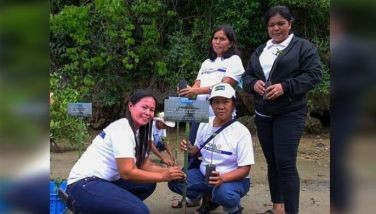Improving breast cancer survivorship
Maria, a 48-year-old single mother of two, faced the grim reality of breast cancer at a private hospital. While her HMO insurance covered just one chemotherapy session, the treatment costs were intimidating. Though Maria explored multiple avenues for support, including family and government aid, the paperwork and processes were daunting. Notably, the trust she had built with her medical team and the emotional support from her patient group were valuable aspects she couldn’t quickly leave behind.
Breast cancer is a significant concern in the Philippines, being the most common cancer among Filipino women. About three in every 100 women are expected to face this diagnosis before reaching the age of 75. Among them was my mother, Ning, who was diagnosed at 65 and, sadly, passed away in 2019. Disturbingly, 53 percent are diagnosed at critical Stages III and IV. These urgent circumstances call for proactive initiatives.
Multi-stakeholder dialogue creates a consolidated response
Recognizing the critical nature of breast cancer survivorship, the Philippine Cancer Society (PCS) and ICanServe Foundation initiated the “Inspiring Conversations on Breast Cancer” series. From July to August 2023, this five-part dialogue was organized by the Swiss Chamber of Commerce of the Philippines (SwissCham Philippines) and supported by Novartis Healthcare Philippines.
Central to these discussions were the goals set by the World Health Organization (WHO) Global Breast Cancer Initiative (GBCI), which aims to curtail breast cancer mortality by 2.5 percent annually, translating to an impressive 2.5 million lives saved over two decades. This initiative revolves around three central goals from the World Health Organization’s Global Breast Cancer Initiative (GBCI):
• Health Promotion and Early Detection: Department of Health Undersecretary Rosario Vergeire acknowledged the efforts of ICanServe Foundation’s “Ating Dibdibin” program in Taguig City and other sites and the Philippine Cancer Society’s ACT NOW initiative in Quezon City. These programs focus on early detection, patient navigation, comprehensive care and the use of digital technology.
Joining Undersecretary Vergeire in emphasizing the pivotal role of health literacy and promotion were Dr. Ann Meredith Garcia-Trinidad of the Philippine Society of Medical Oncology (PSMO), Dr. Beaver Tamesis of Asian Hospital & Medical Center, Dr. Maria Cecilia Pagdanganan of St. Luke’s Medical Center, and Mr. Joel Chong of Novartis.
• Timely Diagnosis: Dr. Corazon Ngelangel and Dr. Rachel Rosario of the Philippine Cancer Society led a call for a more organized national breast cancer screening program. Other prominent health professionals joined their voices: Dr. Marie Belle Francia of St. Luke’s Medical Center, Dr. Gerardo Legaspi of UP-Philippine General Hospital, Dr. Alfonso Nuñez III of Philippine Cancer Center and Dr. Kenny Jun Demegillo of the Southern Philippines Medical Center.
Targeting high-risk women at the grassroots levels is central to their advocacy, emphasizing that such an initiative is paramount for early diagnosis, optimal treatment and improved survivorship.
• Comprehensive Breast Cancer Management: Dr. Nuñez emphasized a multi-faceted approach for breast cancer patients, involving holistic care, accurate data gathering, focused research, enhanced supportive and palliative care and crafting long-term survivorship plans.
The multidisciplinary approach and the possibility of implementing inter-hospital navigation was suggested by Dr. Josephine Tolentino when she shared the story of Maria.
As Dr. Conrado Lorenzo III of Healthway Cancer Care Hospital pointed out, collaborative public-private endeavors play a pivotal role, emphasizing that much of the cost burden arises from misdiagnosis. Echoing this, Dr. Manuel Francisco Roxas of AC Health stressed the importance of outcome measurements to ensure value-based, patient-centric services that uplift patient experiences.
Stressing the importance of aligned actions and leadership in medical governance, Dr. Eugene Ramos of The Medical City and Dr. Jan Aura Llevado of the DOH Disease Prevention & Control Bureau advocated for a unified direction in health care actions that reflect shared goals.
Ms. Kara Magsanoc-Alikpala urged to work towards the shared goal of accelerating full implementation of the National Integrated Cancer Control Act.
Vincent Sumergido of the DOH Cancer Control Division offered insights on enhancing hospital capabilities, urging measures like effective procurement and resource maximization in government hospitals.
Lastly, Dr. Buenaventura Ramos of PSMO shared a unique perspective on mindfulness and psychosocial care in cancer. This was also highlighted by Adora Perez of patient group Corridor of Hope as crucial in overcoming patient fears of recurrence.
A unified approach to confronting breast cancer
Breast cancer’s impact, as seen through Maria’s journey and many others, is a reminder of why we need a consolidated response. After attending the series, Giselle Arroyo, a breast cancer survivor and ICanServe member, echoed this sentiment. She observed how stakeholders from different sectors have aligned goals yet often face similar challenges. Giselle gained a newfound appreciation for the WHO GBCI, and was particularly impressed by the potential of initiatives like those by Southern Philippines Medical Center for broader adoption.
By harnessing the strength and expertise of various sectors, we have a real chance to enact meaningful change. Our collective efforts can transform the breast cancer care landscape in the Philippines, ultimately saving more lives, including that of Maria.
* * *
Christine Fajardo is chairperson of the Swiss Chamber of Commerce of the Philippines and communications & engagement head of Novartis.
- Latest
- Trending



























